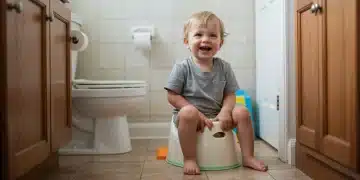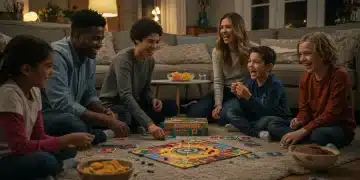Chores for Kids: Age-Appropriate Tasks That Teach Responsibility

Chores for kids are age-appropriate tasks that not only help around the house but also teach responsibility, foster independence, and build valuable life skills, contributing to their overall development.
Teaching kids responsibility can start early through age-appropriate chores. Chores for kids: Age-appropriate tasks that teach responsibility offer numerous benefits for children’s development and family harmony. This guide explores how to introduce chores effectively.
Why Assigning Chores is Important for Kids
Assigning chores to children is more than just getting help around the house. It’s a crucial part of their development, fostering independence, responsibility, and a sense of contribution to the family unit. Let’s delve into the key benefits of incorporating chores into a child’s routine.
Building Responsibility and Independence
Chores teach children that they are responsible for their actions and contribute to their environment. By completing tasks independently, they gain confidence and learn to manage their time effectively.
Developing Life Skills
From laundry to cooking, chores introduce valuable life skills that kids will need as they grow older. These skills not only prepare them for independent living but also boost their self-esteem.
- Teaches time management.
- Encourages problem-solving.
- Prepares for future independence.
Assigning chores helps children develop a sense of responsibility. Kids learn that they have a role to play in maintaining the household and that their contributions are valued. This sense of responsibility translates into other areas of their lives, such as school and personal relationships.
Age-Appropriate Chores for Toddlers (2-3 Years Old)
Even toddlers can participate in simple chores. It’s all about introducing them to the concept of helping and making it fun. Focus on tasks that are safe, easy to understand, and engaging for their age group.
Simple Tasks They Can Handle
Toddlers can help with tasks like putting toys away, wiping up spills, or fetching small items. These activities help them develop fine motor skills and a sense of order.
Making it Fun and Engaging
Turn chore time into playtime by singing songs or making it a game. This approach helps toddlers associate chores with positive experiences.

- Picking up toys and books.
- Putting clothes in the hamper.
- Helping wipe up spills.
Assigning chores to toddlers gives them a sense of accomplishment and enhances their motor skills. Engaging them in these tasks builds their self-esteem and a positive attitude towards responsibility from an early age.
Chores for Preschoolers (4-5 Years Old)
Preschoolers are capable of handling more complex chores than toddlers. At this age, they can follow simple instructions and enjoy contributing to household tasks. These chores can help develop their coordination and instill a sense of responsibility.
Tasks They Can Manage
Preschoolers can start making their beds, setting the table, and watering plants. These chores require a bit more coordination and attention to detail.
Encouraging Independence
Allow preschoolers to complete chores independently, offering guidance and support as needed. This fosters their sense of self-reliance and competence.
Preschoolers can also assist with preparing meals, such as washing fruits and vegetables or stirring ingredients. Supervise them closely to ensure their safety and provide clear instructions.
Chores for Elementary School Kids (6-11 Years Old)
Elementary school kids can take on more significant responsibilities around the house. These chores help them develop a strong work ethic, time-management skills, and a sense of ownership over their environment. It’s a great time to introduce more complex tasks.
Increasing Responsibility
Elementary school kids can do laundry, vacuum, and help with meal preparation. These chores require more effort and attention to detail.
Developing a Work Ethic
By consistently completing chores, kids learn the importance of hard work and perseverance. This work ethic will benefit them in school and future endeavors.

- Doing laundry (with supervision).
- Vacuuming and sweeping floors.
- Helping prepare meals.
Chores for elementary school kids can be quite varied. Help them learn the importance of teamwork, contributing to the overall well-being of the family and instilling valuable habits.
Chores for Teenagers (12+ Years Old)
Teenagers are capable of handling complex and demanding chores. This is the time to prepare them for independent living by assigning them tasks that require responsibility, organization, and problem-solving skills. Chores at this age should resemble those they’ll encounter in their own homes one day.
Preparing for Independence
Teenagers can manage household finances, handle yard work, and take care of younger siblings. These chores prepare them for the responsibilities of adulthood.
Real-Life Responsibilities
Encourage teenagers to take on real-life responsibilities, such as managing a budget or planning a family outing. This helps them develop valuable problem-solving and decision-making skills.
Teenagers can learn to handle more hands-on projects, such as doing laundry independently, grocery lists or meal planning. By involving them in more complex chores, parents can slowly transition towards giving them more freedom around the household.
Tips for Making Chores a Success
To ensure chores are a positive experience for everyone, it’s important to set clear expectations, provide encouragement, and offer rewards. Here are some tips for making chores a success in your household.
Set Clear Expectations
Clearly define each chore, explaining how it should be done and what the expected outcome is. This helps kids understand their responsibilities and avoid confusion.
Provide Encouragement and Support
Offer praise and encouragement when kids complete chores successfully. This reinforces positive behavior and motivates them to continue helping out.
- Create a chore chart.
- Offer rewards for completing chores.
- Make it a family affair.
Making chores a success for kids involves a combination of positive reinforcement, clear expectations, and a supportive environment. Encourage responsibility and instill a positive attitude towards household tasks.
| Key Point | Brief Description |
|---|---|
| 🧑🤝🧑 Responsibility | Chores teach kids responsibility and contribution. |
| 💪 Independence | Kids gain independence by completing tasks alone. |
| 🌱 Life Skills | Chores offer essential life skills for the future. |
| 📅 Age Matters | Tasks should match a child’s age and abilities. |
Frequently Asked Questions (FAQ)
▼
Kids can start with simple tasks around 2-3 years old, such as putting away toys. The key is to make it fun and age-appropriate.
▼
It depends on the child’s age and abilities. Start with one or two simple chores and gradually increase the number as they get older.
▼
Some parents choose to pay for extra chores, while others prefer to focus on the responsibility aspect. It’s a personal decision based on your family values.
▼
Stay firm but understanding. Discuss the importance of chores and try to find tasks that align with their interests. Consistency is key to success.
▼
Turn chores into a game, play music, or offer small rewards for completing tasks. Making it fun can help reduce resistance and foster cooperation.
Conclusion
Incorporating age-appropriate chores for kids is a fantastic way to teach responsibility, build essential life skills, and foster a sense of independence. By making chores a positive and engaging experience, parents can help their children develop into well-rounded, capable individuals who contribute to the family and are prepared for the future.





